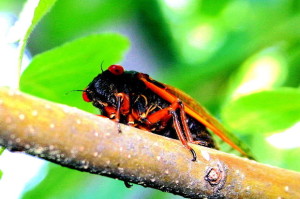June 2013 Message from the Guildmaster
June 4, 2013 by Jeff Bibb
Filed under Message from the Guildmaster
 Greetings:
Greetings:
Summer has arrived in central Virginia with a vengeance. Temperatures in the upper 80’s are combined with frequent showers and thunderstorms. The humidity is approaching its normal sticky level of discomfort. This year also marks the return of the cicada, and we are assaulted with a loud thrumming drone each time we step outside. Interestingly, cicadas seem to be some kind of delicacy for the local dogs. Our dog, Sparky, can consume a couple of dozen on his walk. This must be the canine equivalent of oysters on the half shell.
With the warm season, our local snake population also emerges. This year, there seem to be more copperhead snakes than usual. A little investigation revealed that one of their favorite foods is the cicada. Yesterday, one of our friends was bitten by a copperhead while walking in her yard, carrying some plants. She had neglected to put on her normal work boots, opting for sandals instead. She calmly retrieved a shovel, annihilated the offender, went inside and looked up her plight on Google, and then called us. Jan drove her to the hospital where she was treated with anti-venom and kept for the night for observation. This morning she reported that her leg is still swollen and colored with a mixture of black and blue hues. She is ready to come home as soon as they let her go. She promises to never chide me again for my healthy respect and distaste for poisonous reptiles.
During colonial times, snakebite was a real threat for many settlers and explorers. Medical practice at the time did not have an understanding of infections, cell destruction, and many other illnesses. Being bit by a poisonous snake could be lethal in a very real sense. While we in the modern western world take anti-venoms for granted, many countries around the world do not have this treatment available. As a result, their treatments harken back to older times and practices.
One of the most common treatments for snake bites in previous centuries involved consuming large amounts of alcohol. I suppose that the victim would be somewhat numbed from the pain of the poison. It was claimed that the alcohol counteracted the poison’s effects and vice versa. In addition a poultice of wet tobacco was often applied to the wound. This treatment is still in vogue today, since the largest majority of snakebite victims are young males who are severely intoxicated.
When I was young, there was an old Native American woman who lived on our farm and often helped my mother. Cal would often look after me at home if my mother needed to visit someone or run errands. She had a wealth of knowledge about the “old ways” including medical treatments. I remember her telling a story about her grandmother being bitten by a rattlesnake in the 1800’s. Her family got her very drunk and kept her that way for a week or more. She recovered and went on with her life.
Another common snakebite treatment was the application of plantain leaves, along with some powdered tobacco. Plantain plants and leaves are widely used in homeopathic treatments and much information is available regarding their use. Harts horn was another common item carried by colonial settlers as a treatment for various afflictions. Made from the shavings of deer antlers, the powder was mixed with oils as a tonic, or applied as a powder with a wet compress.
I suppose the most interesting snakebite treatment is one used in Asia. It is known as the three chicken method. A chicken is cut open across the breast and tied over the bite wound. It is noted that the chicken will become lethargic, short of breath, and then die. A second, and then a third chicken are applied to the wound in sequence. One wonders how many folks have passed away looking at a chicken tied to their leg?
The point of all of this is that these remedies have been proven to work in many cases. With some brief research, it appears that there is some scientific fact to back them up. Many are still practiced in remote and underdeveloped parts of the world. My grandfather maintained that there were plants on our mountainside that would cure anything, and that modern medicine was moving in the wrong direction. He may have been correct, but in the event of a snakebite, I think I’ll take my chances with modern treatment.
As usual, I welcome your comments, criticisms, and other observations.
All the best,
Jeff Bibb
Guildmaster





